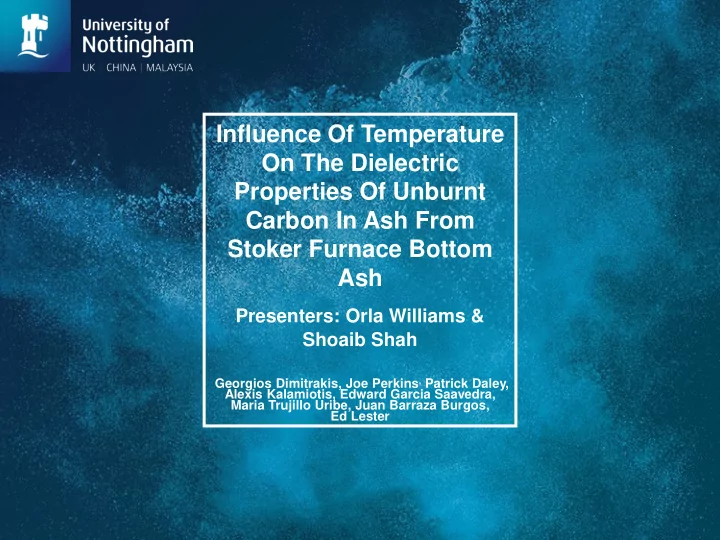

Influence Of Temperature On The Dielectric Properties Of Unburnt Carbon In Ash From Stoker Furnace Bottom Ash Presenters: Orla Williams & Shoaib Shah Georgios Dimitrakis, Joe Perkins , Patrick Daley, Alexis Kalamiotis, Edward Garcia Saavedra, Maria Trujillo Uribe, Juan Barraza Burgos, Ed Lester
Sugar Mill Stoker Furnace Stoker furnace with an over-grid feeding system 2 Source: ValveExport
Inside the Furnace
Stoker Furnace – Carbon in Ash Problem
Dielectric Sensoring of Carbon in Ash Aim: Gain an understanding of how dielectrics carbon in ash vary with carbon content, mineral composition and temperature Objective: Develop methodology of measuring carbon in ash in real time using dielectric properties Experiment: • Tested 3 industrial ashes and several minerals with varying carbon contents different cavities to ascertain dielectric properties at different carbon contents • Tested 3 industrial ashes at high temperatures to see how dielectric properties vary with temperature
The Electromagnetic Spectrum
Dielectric Properties • All materials interact with materials under the influence of a electromagnetic field. • The electrical interaction of materials is described by its permittivity • The absolute complex permittivity ( ɛ) of a material is : 𝜁 = 𝜁 ′ − 𝑘𝜁 ′′ • Where ɛ’ is the dielectric constant and ɛ’’ is the dielectric loss factor. • ɛ’ describes a materials ability to absorb electrical energy, while ɛ’’ is a materials ability to reject this energy as heat
Dielectric Properties at Different Frequencies
Dielectric Properties of Common Materials at 2.45 GHz
Cavity 1 – Proof of Concept • Copper cavity connected to network analyser • 5 different frequencies between 937 MHz and 5.6 GHz tested • 3 industrial ashes and 4 minerals tested with varying carbon contents (by weight) • Carbon contents: Fly Ash 1 - 2.2%, Fly Ash 2 – 10%, Fly Ash 3 – 6.6%
Cavity 1 – 937 MHz – Fly Ash 1
Cavity 1 – 937 MHz – Minerals – Calcium Carbonate
Cavity 2 – Cavity Perturbation Technique Furnace Vector Cavity Network Analyser Automated motor Associated Furnace computer Temperature and screen control unit
Dielectric Constant of Fly Ash 1 with Varying Carbon Content
Dielectric Loss of Fly Ash 1 with Varying Carbon Content
High Temperature Dielectric Properties of Coal
High Temperature Dielectric Constant of Ash at 2470 MHz
High Temperature Dielectric Loss of Ash at 2470 MHz
Summary • Proof of concept tests show that the dielectric properties of ash varies with carbon content • Signal depends on carbon content and mineral composition of the ash • Dielectric properties of coal and unburnt carbon in ash are very different • Up to 400 degrees, dielectric constant of industrial ashes is stable, and then drops with increasing temperature • Knowledge of dielectric properties can be used to develop continuous inline monitoring system for carbon in ash contents
Thank you for listening For further information contact Orla.Williams@Nottingham.ac.uk The authors would like to thank the British Council Newton Fund, the Engineering Doctorate Centre for Carbon Capture and Storage and Cleaner Fossil Energy, Drax Power and British Sugar their support throughout this project
Recommend
More recommend